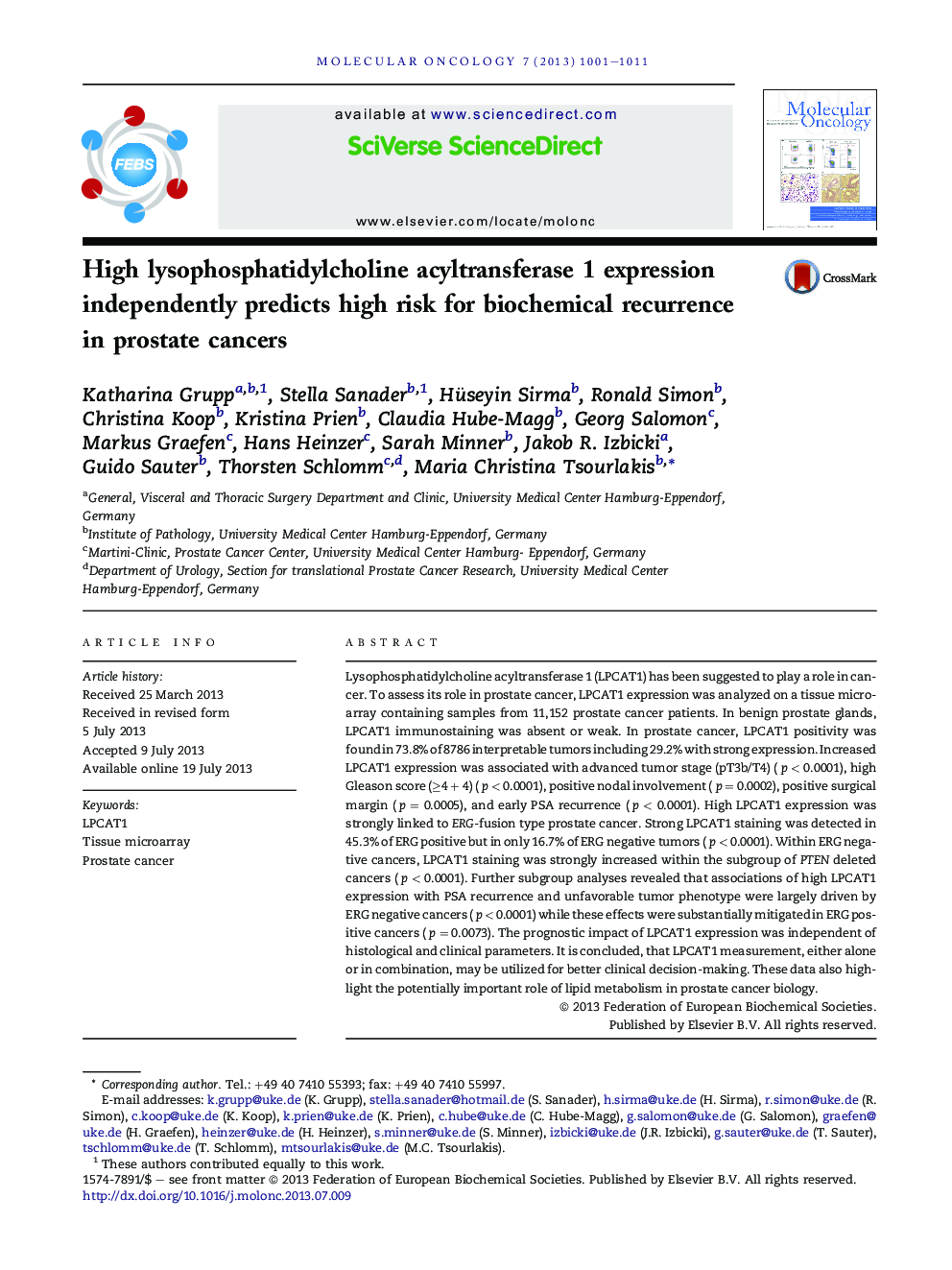| کد مقاله | کد نشریه | سال انتشار | مقاله انگلیسی | نسخه تمام متن |
|---|---|---|---|---|
| 2145612 | 1088806 | 2013 | 11 صفحه PDF | دانلود رایگان |
عنوان انگلیسی مقاله ISI
High lysophosphatidylcholine acyltransferase 1 expression independently predicts high risk for biochemical recurrence in prostate cancers
دانلود مقاله + سفارش ترجمه
دانلود مقاله ISI انگلیسی
رایگان برای ایرانیان
موضوعات مرتبط
علوم زیستی و بیوفناوری
بیوشیمی، ژنتیک و زیست شناسی مولکولی
تحقیقات سرطان
پیش نمایش صفحه اول مقاله

چکیده انگلیسی
Lysophosphatidylcholine acyltransferase 1 (LPCAT1) has been suggested to play a role in cancer. To assess its role in prostate cancer, LPCAT1 expression was analyzed on a tissue microarray containing samples from 11,152 prostate cancer patients. In benign prostate glands, LPCAT1 immunostaining was absent or weak. In prostate cancer, LPCAT1 positivity was found in 73.8% of 8786 interpretable tumors including 29.2% with strong expression. Increased LPCAT1 expression was associated with advanced tumor stage (pT3b/T4) (p < 0.0001), high Gleason score (â¥4 + 4) (p < 0.0001), positive nodal involvement (p = 0.0002), positive surgical margin (p = 0.0005), and early PSA recurrence (p < 0.0001). High LPCAT1 expression was strongly linked to ERG-fusion type prostate cancer. Strong LPCAT1 staining was detected in 45.3% of ERG positive but in only 16.7% of ERG negative tumors (p < 0.0001). Within ERG negative cancers, LPCAT1 staining was strongly increased within the subgroup of PTEN deleted cancers (p < 0.0001). Further subgroup analyses revealed that associations of high LPCAT1 expression with PSA recurrence and unfavorable tumor phenotype were largely driven by ERG negative cancers (p < 0.0001) while these effects were substantially mitigated in ERG positive cancers (p = 0.0073). The prognostic impact of LPCAT1 expression was independent of histological and clinical parameters. It is concluded, that LPCAT1 measurement, either alone or in combination, may be utilized for better clinical decision-making. These data also highlight the potentially important role of lipid metabolism in prostate cancer biology.
ناشر
Database: Elsevier - ScienceDirect (ساینس دایرکت)
Journal: Molecular Oncology - Volume 7, Issue 6, December 2013, Pages 1001-1011
Journal: Molecular Oncology - Volume 7, Issue 6, December 2013, Pages 1001-1011
نویسندگان
Katharina Grupp, Stella Sanader, Hüseyin Sirma, Ronald Simon, Christina Koop, Kristina Prien, Claudia Hube-Magg, Georg Salomon, Markus Graefen, Hans Heinzer, Sarah Minner, Jakob R. Izbicki, Guido Sauter, Thorsten Schlomm, Maria Christina Tsourlakis,